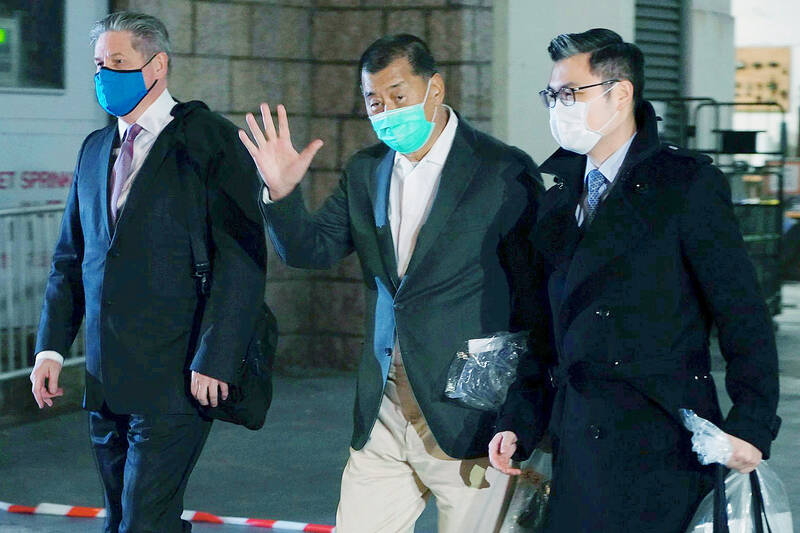More than 100 journalists and editors have signed an open letter calling for the immediate release of media mogul Jimmy Lai (黎智英), who has been detained in Hong Kong on national security charges.
Leading global media figures — including the Guardian editor-in-chief Katharine Viner and Nobel peace prize winner Maria Ressa — called for the charges against Lai and other journalists in Hong Kong to be dropped.
Lai, who is 75 and was first arrested in 2020, is the founder and publisher of the Apple Daily, a liberal newspaper that was forced to close in 2021 after the Chinese Communist Party cracked down on pro-democracy protests.

Photo: AP
A longtime critic of the party, Lai is now one of the most high-profile activists in Hong Kong to have been arrested since the Chinese government imposed a sweeping National Security Law on the territory in 2020.
Lai was charged with contravening the National Security Law in August 2020. His trial for that case is scheduled for September, but since his arrest he has been convicted on separate charges of fraud and organizing illegal protests — charges that his supporters say are politically motivated.
The signatories to the letter, which was organized by Reporters Without Borders (RSF), said: “We, as publishers and editors of news media organisations from around the world, are united in support of Apple Daily founder and publisher Jimmy Lai, and his fight for media pluralism and press freedom in Hong Kong.”
“Jimmy Lai has stood for these values his entire life... In a tremendous act of courage, he chose to stay in Hong Kong and continued to publish as long as he could, despite the severe crackdown taking place around him,” the letter said.
Hong Kong is ranked 140th out of 180 countries in RSF’s 2023 World Press Freedom Index, down from 58th place 10 years ago.
In March, Caoilfhionn Gallagher, Lai’s international lawyer, said the tactics used by Hong Kong’s authorities amounted to “lawfare” — the use of legal mechanisms to suppress opposition — citing the fraud conviction as a tool to smear Lai’s character.
On Thursday, Hong Kong passed a law allowing authorities to ban foreign lawyers from working on national security cases, as a means of preventing Lai from engaging British lawyer Tim Owen in his coming trial.
Lai’s supporters have also criticized the British government for not doing enough to advocate for Lai’s release.
Last week, Sebastian Lai (黎崇恩), the elder Lai’s son, said the British government was “incredibly weak” for failing to call for the release of his father.
A spokesperson for the UK Foreign Office said it had “regularly” brought its concerns to Chinese and Hong Kong authorities, including the foreign secretary raising Lai’s case at the UN Human Rights Council in February.
“We have made clear our strong objection to China’s imposition of the National Security Law in Hong Kong, which is being used in a deliberate attempt to target and silence pro-democracy figures, including Jimmy Lai,” the spokesperson said.

DEFENDING DEMOCRACY: Taiwan shares the same values as those that fought in WWII, and nations must unite to halt the expansion of a new authoritarian bloc, Lai said The government yesterday held a commemoration ceremony for Victory in Europe (V-E) Day, joining the rest of the world for the first time to mark the anniversary of the end of World War II in Europe. Taiwan honoring V-E Day signifies “our growing connections with the international community,” President William Lai (賴清德) said at a reception in Taipei on the 80th anniversary of V-E Day. One of the major lessons of World War II is that “authoritarianism and aggression lead only to slaughter, tragedy and greater inequality,” Lai said. Even more importantly, the war also taught people that “those who cherish peace cannot

STEADFAST FRIEND: The bills encourage increased Taiwan-US engagement and address China’s distortion of UN Resolution 2758 to isolate Taiwan internationally The Presidential Office yesterday thanked the US House of Representatives for unanimously passing two Taiwan-related bills highlighting its solid support for Taiwan’s democracy and global participation, and for deepening bilateral relations. One of the bills, the Taiwan Assurance Implementation Act, requires the US Department of State to periodically review its guidelines for engagement with Taiwan, and report to the US Congress on the guidelines and plans to lift self-imposed limitations on US-Taiwan engagement. The other bill is the Taiwan International Solidarity Act, which clarifies that UN Resolution 2758 does not address the issue of the representation of Taiwan or its people in

US Indo-Pacific Commander Admiral Samuel Paparo on Friday expressed concern over the rate at which China is diversifying its military exercises, the Financial Times (FT) reported on Saturday. “The rates of change on the depth and breadth of their exercises is the one non-linear effect that I’ve seen in the last year that wakes me up at night or keeps me up at night,” Paparo was quoted by FT as saying while attending the annual Sedona Forum at the McCain Institute in Arizona. Paparo also expressed concern over the speed with which China was expanding its military. While the US

‘FALLACY’: Xi’s assertions that Taiwan was given to the PRC after WWII confused right and wrong, and were contrary to the facts, the Ministry of Foreign Affairs said The Ministry of Foreign Affairs yesterday called Chinese President Xi Jinping’s (習近平) claim that China historically has sovereignty over Taiwan “deceptive” and “contrary to the facts.” In an article published on Wednesday in the Russian state-run Rossiyskaya Gazeta, Xi said that this year not only marks 80 years since the end of World War II and the founding of the UN, but also “Taiwan’s restoration to China.” “A series of instruments with legal effect under international law, including the Cairo Declaration and the Potsdam Declaration have affirmed China’s sovereignty over Taiwan,” Xi wrote. “The historical and legal fact” of these documents, as well